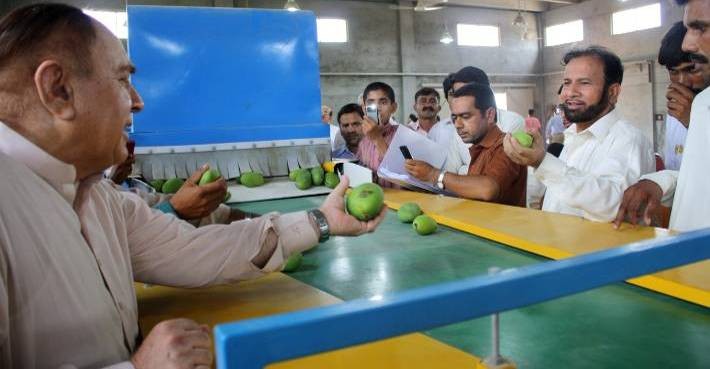
USAID funded processing lines have revolutionized Pakistan's Mango Industry.
Firms Project
USAID’s assistance is help Pakistan’s mango sector increase the quality, production and exports of the fruit.
“The USAID-supported mango processing facilities are increasing the fruit quality and their survival during sea transfers which are by far the most commercially viable means of transporting mangos to foreign markets.”
— Junaid Hyder Shah, owner of the Hyder Shah Farm in Sindh
Despite its tremendous economic potential, Pakistan’s mango sector has been unable to capitalize on the high-end international markets. Due to the lack of modern equipment, practices and infrastructure at the farm level, the sector struggles with large post-harvest losses and the inability to supply consistent quality fruit.
Recognizing these gaps, USAID launched a small-scale mango assistance program in late 2009. The program offered technical and financial assistance to 13 mango farms in Punjab and Sindh to establish on-farm fresh mango processing facilities, including blast chillers, hot water treatment units, cold storage and processing lines. Additionally, more than 4,500 farm workers were trained in modern harvesting and handling of the fruit. They also learned about food and personnel safety, sanitation standards, equipment operations, maintenance and troubleshooting.
By late 2011, participating farms had increased their mango harvests by 20 percent and the production of sale-quality fruit by 13 percent per acre. Overall export volume has increased by 236 percent. One of the USAID-supported farms, Lutfabad Fruit Farm in Punjab, processed 127.5 tons of mangos and sent 25 air and sea shipments to the Gulf European Union countries. “I could not have achieved this without USAID support,” said Major Tariq, owner of the Lutfabad Farm.
Improved quality has in turn had an impact on the pricing of the fruit. Participating farms have been able to get a 26 percent higher price per ton of mangos in domestic markets and a 61 percent higher price in international markets.
“The USAID-supported mango processing facilities are increasing the fruit’s quality and their survival during sea transfers which are by far the most commercially viable means of transporting mangos to foreign markets,” says Junaid Hyder Shah, owner of the Hyder Shah Farm in Sindh. This farm processed and delivered 150 tons of mangos to the Middle East and earned more than four million rupees in profit.
Employment has also increased at the supported farms. Full-time female employment has doubled and male employment has grown by half. “Now that I am also earning, I feel good,” said Hina Mansab, a newly hired farm worker at Lutfabad Farm.
File Attachment







Comment
Make a general inquiry or suggest an improvement.